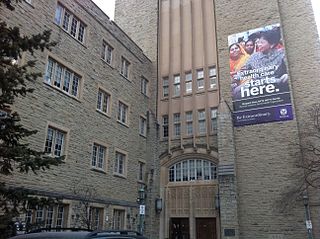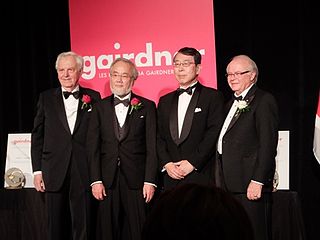Related Research Articles

Xenotransplantation, or heterologous transplant, is the transplantation of living cells, tissues or organs from one species to another. Such cells, tissues or organs are called xenografts or xenotransplants. It is contrasted with allotransplantation, syngeneic transplantation or isotransplantation and autotransplantation. Xenotransplantation is an artificial method of creating an animal-human chimera, that is, a human with a subset of animal cells. In contrast, an individual where each cell contains genetic material from a human and an animal is called a human–animal hybrid.

The Temerty Faculty of Medicine is the medical school of the University of Toronto. Founded in 1843, the faculty is based in Downtown Toronto and is one of Canada's oldest institutions of medical studies, being known for the discovery of insulin, stem cells and the site of the first single and double lung transplants in the world.
Phil Gold is a Canadian physician, scientist, professor and author.

The Toronto General Hospital (TGH) is a major teaching hospital in Toronto, Ontario, Canada and the flagship campus of University Health Network (UHN). It is located in the Discovery District of Downtown Toronto along University Avenue's Hospital Row; it is directly north of The Hospital for Sick Children, across Gerrard Street West, and east of Princess Margaret Cancer Centre and Mount Sinai Hospital. The hospital serves as a teaching hospital for the University of Toronto Faculty of Medicine. In 2019, the hospital was ranked first for research in Canada by Research Infosource for the ninth consecutive year.
John Robert Evans was a Canadian cardiologist, academic, businessperson, and civic leader.
The Gairdner Foundation is a non-profit organization devoted to the recognition of outstanding achievements in biomedical research worldwide. It was created in 1957 by James Arthur Gairdner to recognize and reward the achievements of medical researchers whose work contributes significantly to improving the quality of human life. Since the first awards were made in 1959, the Gairdner Awards have become Canada's most prestigious medical awards, recognizing and celebrating the research of the world’s best and brightest biomedical researchers. Since 1959, more than 390 Canada Gairdner Awards have been given to scientists from 35 countries; of these recipients, 98 have subsequently gone on to win a Nobel Prize.
Joseph Louis Rotman,, was a noted Canadian businessman and philanthropist. Rotman was the founder, benefactor and member of many successful organizations, such as the Clairvest Group Inc., the Rotman Research Institute, the Rotman School of Management, and the Rotman Institute of Philosophy. Throughout his life, he received three honorary degrees, as well as an induction into the Canadian Business Hall of Fame. He is well-regarded for donating his time and financial assistance to numerous philanthropic causes including the arts, education and healthcare.
James Edgar Till is a University of Toronto biophysicist, best known for demonstrating – with Ernest McCulloch – the existence of stem cells.

Ernest Armstrong McCulloch was a University of Toronto cellular biologist, best known for demonstrating – with James Till – the existence of stem cells.
Robert Laing Noble was a Canadian physician who was involved in the discovery of vinblastine.
Murray Llewellyn Barr was a Canadian physician and medical researcher who discovered with graduate student Ewart George Bertram, in 1948, an important cell structure, the "Barr body".

The Schulich School of Medicine and Dentistry is the combined medical school and dental school of the University of Western Ontario, a public university in London, Ontario, Canada
MaRS Discovery District is a not-for-profit corporation founded in Toronto, Ontario, Canada in 2000. Its stated goal is to commercialize publicly funded medical research and other technologies with the help of local private enterprises and as such is a public-private partnership. As part of its mission MaRS says, "MaRS helps create successful global businesses from Canada's science, technology and social innovation." As of 2014, startup companies emerging from MaRS had created more than 4,000 jobs, and in the period of 2011 to 2014 had raised over $750 million in capital investments.
Mark Adam Hardy was Auchincloss Professor of Surgery, Director Emeritus of the Transplant Centre, and Vice Chairman and Residency Program Director of the Department of Surgery at the Columbia University College of Physicians and Surgeons and NewYork-Presbyterian Hospital in New York City. He retired from Columbia in 2023, after almost 50 years of service.
Alan Bernstein is Professor Emeritus at the University of Toronto and President Emeritus of the Canadian Institute for Advanced Research (CIFAR), where he served as President and CEO from 2012 to 2022. A Distinguished Fellow at the Munk School of Global Affairs and Public Policy, he is also a Fellow and Member of the Standing Committee for Science Planning at the International Science Council (2022-2025). Canadian Bernstein is recognized as a leader in health research, science policy, mentorship and organizational leadership.
Till & McCulloch are James Till and Ernest McCulloch who, while studying the effect of radiation on the bone marrow of mice at the Ontario Cancer Institute, in Toronto, demonstrated the existence of multipotent stem cells in 1961.

John Herbert Dirks is a Canadian physician.

David Lorne John Tyrrell is a Canadian physician.
Bernard Langer was a Canadian surgeon and educator. In 2015, he was inducted into the Canadian Medical Hall of Fame.
Jean-François Borel is a Belgian microbiologist and immunologist who is considered one of the discoverers of cyclosporin.
References
- 1 2 "Calvin R. Stiller, MD". Canadian Medical Hall of Fame. Retrieved 2024-03-14.
- ↑ "Calvin Stiller to receive Canada Gairdner Wightman Award". Schulich School of Medicine and Dentistry. April 6, 2010.
- ↑ "Calvin R. Stiller, MD". Canadian Medical Hall of Fame.
- ↑ Stiller, Brian (June 25, 2010). "The Making of a Prairie Teacher". Brian Stiller.
- ↑ "Mildred Stiller". Saskatoon StarPhoenix. December 19, 2009.
- ↑ "Calvin R. Stiller". MaRS Discovery District.
- ↑ "Calvin R. Stiller, MD". Canadian Medical Hall of Fame.
- ↑ "Calvin R. Stiller". MaRS Discovery District.
- ↑ Winders, Jason (April 15, 2010). "Stiller claims two major medical honours". Western News.
- ↑ Winders, Jason (January 3, 2012). "Western medical pioneer honoured". Western News.
- ↑ Winders, Jason (January 3, 2012). "Western medical pioneer honoured". Western News.
- ↑ "Calvin R. Stiller". MaRS Discovery District.
- ↑ "Dr. Calvin R. Miller, OC". University of British Columbia.
- ↑ Abraham, Carolyn (December 28, 2010). "Calvin Stiller's business sense: Just what the doctor ordered".
- ↑ "York will honour four distinguished citizens at fall convocation". York University. October 3, 2011.
- ↑ "Calvin R. Stiller". MaRS Discovery District.
- ↑ Abraham, Carolyn (December 28, 2010). "Calvin Stiller's business sense: Just what the doctor ordered".
- ↑ "Calvin Stiller, MD" (PDF). Canadian Medical Hall of Fame.
- ↑ "Novartis-Calvin Stiller Chair in Xenotransplantation". University of Western Ontario.
- ↑ "Calvin Stiller". Canada Gairdner Awards.
- ↑ "The Park". Western Discovery Park.
- ↑ "100 Alumni of Influence" (PDF). University of Saskatchewan.
- ↑ "Dr. Calvin Ralph Stiller". Governor General of Canada.
- ↑ "Distinguished Fellows – Canadian Academy of Health Sciences | Académie canadienne des sciences de la santé" . Retrieved 2024-03-14.
- ↑ Foundation, The Gairdner. "Calvin Stiller - Gairdner Foundation Award Winner". The Gairdner Foundation. Retrieved 2024-03-14.